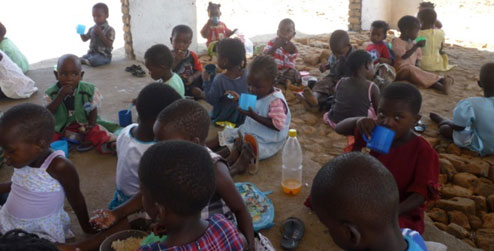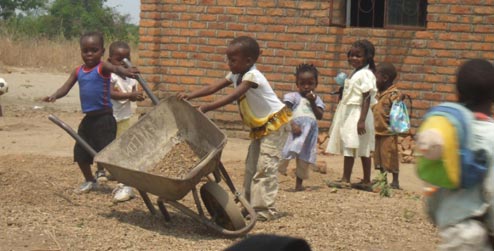For the majority of our stay in Liwonde, we (Beckie, Sammy and Aimee) have been working at the CBCC at Kwatukumbuchire. CBCC stands for Community Based Child Care – essentially a nursery at the centre from 8-11am Monday to Friday.
All the parents are members of Kwatukumbuchire and run the Village Savings & Loans scheme on Wednesdays. The parents pay 200 Malawian kwacha a month, but some parents are unable to which is a big problem for the centre, as this money only pays for milk for the children.
The teachers and caregivers are volunteers and have not received training in any early child development, so are to be commended for the amazing work they do daily.
One drawback, however, was that 1kg of sugar was being added to the children’s milk at break time! Back home, we know that giving that much sugar to toddlers is never going to end well...
However, here they seemed baffled when we explained the link between the sugar and the behaviour after break. Now it’s been pointed out, they are beginning to understand and are gradually lowering the amount of sugar every day. This is making our job a lot easier!

Sammy has worked at a nursery in England for a period of 18 months, and Beckie has done a childcare course at college. Although this knowledge of early childhood development has been helpful to an extent, it has really shown the difference between childcare in the UK and Malawi, and the different challenges it presents.
In the UK, the importance of splitting age groups is paramount. The difference between teaching 0-3 year olds and 3-5 year olds is huge.
When we first arrived, we tried to group the children according to ages. However, we quickly realised that this would not work because of the lack of teachers and the difficulty in separating siblings.
The biggest challenge at CBCC is the lack of resources. We are still amazed at the volunteers’ ability to keep the children amused every day with no teaching resources or toys. In the UK, the feat would be near impossible. The best toy in our CBCC is definitely the wheelbarrow used by the local volunteers for bricks and soil!

When we managed to get hold of some pencils and paper, the children were a little confused, although they had great fun using them as a makeshift drum! However, once the concept was explained, the children loved it and their fine motor skills are really starting to improve.
Although there have been a lot of challenges for us and Kwatukumbuchire in general, our hopes are much greater. We had been eager to paint the classroom, but unfortunately this is not viable due to the lack of resources. Using our initiative and the children’s new found artistic skills, we have transformed the classroom with their pictures and the children create new pictures on the outside of the building using chalk. This has really brightened up the nursery.
We have been impressed beyond measure with the children. Even the younger ones can recite the alphabet, numbers 1-10, the months of the year, the days of the week and even say a small introduction about themselves in English. To have these skills in a second language as a toddler is invaluable, especially in a country where speaking English is looked upon as a sign of being well educated.
They have also impressed us with their co-operation and willingness to share. In a country where poverty and hunger is a big problem, it is uplifting and inspiring to see these children sit and share their snacks with their peers every day.
The executive director, Gilbert, is eager to set up CBCCs in nearby villages and has been providing help and advice to many chiefs to aid the process. Our CBCC is a great help to many parents in the village who otherwise would not be able to work or harvest their fields without it. We believe it would be a very valuable tool in other villages too.
Written by the ICS volunteers in Liwonde.
Photos: (top) Sammy doing drawings with the children; the children drinking milk and sharing snacks at breaktime; playing with the wheelbarrow.



